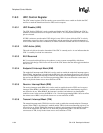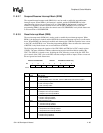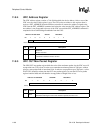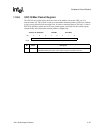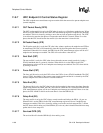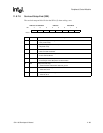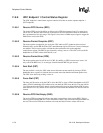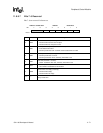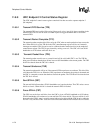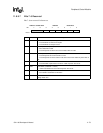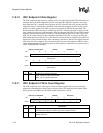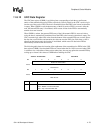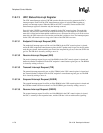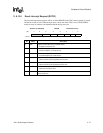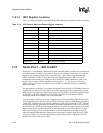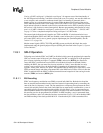
11-72 SA-1100
Developer’s Manual
Peripheral Control Module
11.8.9 UDC Endpoint 2 Control/Status Register
The UDC endpoint 2 control status register contains 6 bits that are used to operate endpoint 2
(IN endpoint).
11.8.9.1 Transmit FIFO Service (TFS)
The transmit FIFO service bit will be active if there are 8 or less (out of 16) bytes remaining in the
transmit FIFO. This bit will be used as a DMA request to trigger the DMA unit to service the
transmit FIFO.
11.8.9.2 Transmit Packet Complete (TPC)
The transmit packet complete bit will be set by the UDC when an entire packet has been sent to the
host. When this bit is set, the TIR bit in the UDC status/interrupt register will be set if transmit
interrupts are enabled. This bit can be used to validate the other status/error bits in the endpoint 2
control/status register. The TPC bit gets cleared by writing a one to it. The UDC will issue NAK
handshakes to all IN tokens while this bit is set.
11.8.9.3 Transmit Packet Error (TPE)
The transmit packet error bit acts as a status bit and will be valid while TPC is set. The TPE bit
being set will indicate that the host did not issue an ACK handshake to the current packet. The TPE
bit will be cleared when the TPC bit is cleared.
11.8.9.4 Transmit Underrun (TUR)
The transmit underrun bit will be set if the transmit FIFO experiences an underrun. This bit will be
valid when the TPC bit is set. When the UDC experiences an underrun, the packet is shortened and
the CRC is corrupted to ensure that the host discards the packet. The TUR bit will be cleared when
the TPC bit is cleared.
11.8.9.5 Sent STALL (SST)
The sent stall bit indicates that a STALL handshake was issued to the host. The CPU writes a one to
this bit to clear it. When this bit is cleared the transmit FIFO is flushed.
11.8.9.6 Force STALL (FST)
The CPU can set the force stall bit to force the UDC to issue a STALL handshake to all IN tokens.
STALL handshakes will continue to be sent until the CPU clears this bit. The sent stall bit (4) will
be set when the STALL state is actually entered (this may be delayed if the UDC is active when the
FST bit is set), and the STALL state will not be exited until both the FST and SST bits are cleared.



